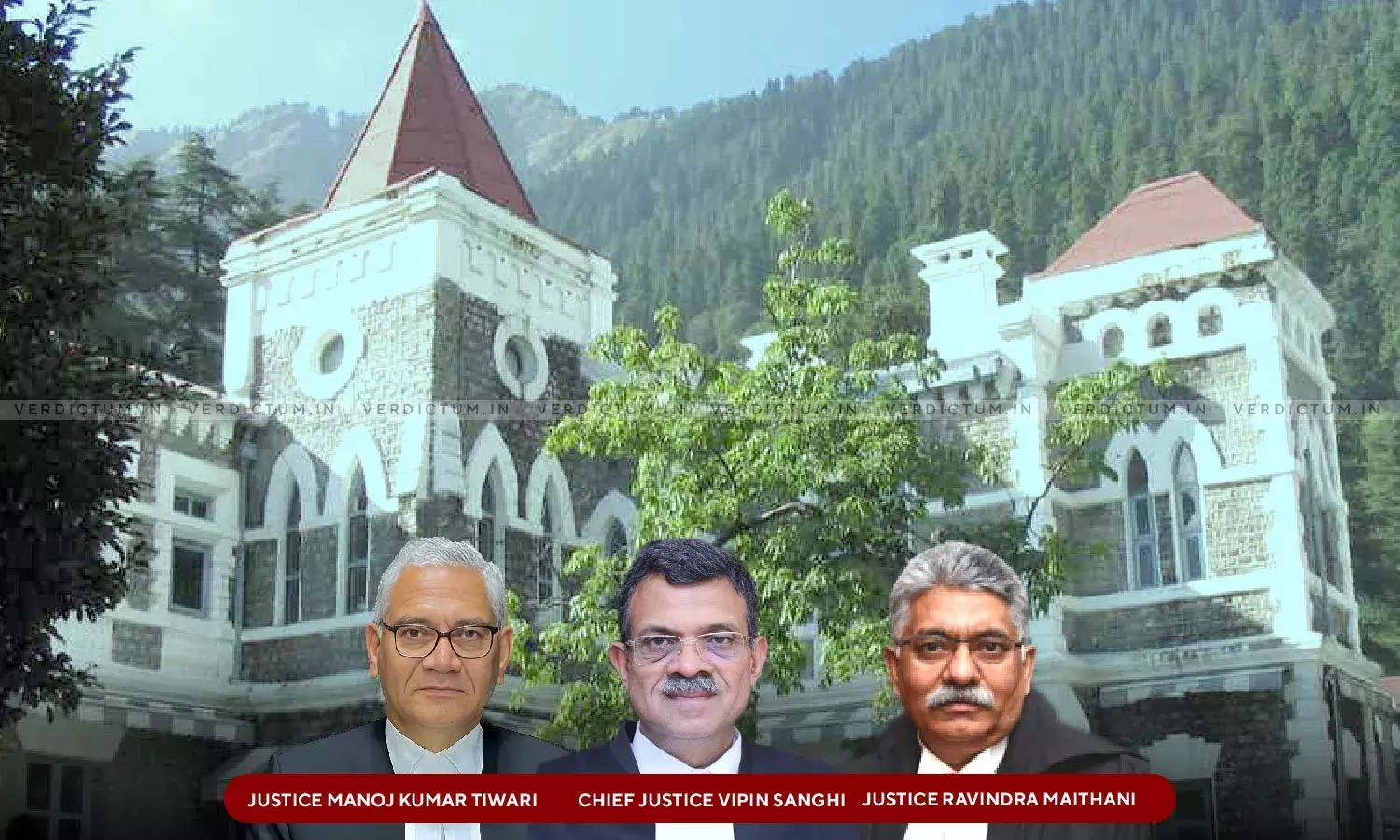Anticipatory Bail Under Section 438 CrPC Can Be Entertained Even After Submission Of Chargesheet- Uttarakhand HC By 2:1 Majority
A Uttarakhand High Court Bench of Chief Justice Vipin Sanghi, Justice Manoj Kumar Tiwari, and Justice Ravindra Maithani has adjudicated the question as to whether an anticipatory bail application of a person can be entertained after the filing of the chargesheet.
With a 2:1 majority, Chief Justice Vipin Sanghi and Justice Manoj Kumar Tiwari have held that the legislature has not imposed any restriction as regards the stage upto which an application for anticipatory bail can be entertained.
In his dissenting opinion, Justice Ravindra Maithani has observed that if the word “arrest” as occurs in Section 438 of the Code is taken to cover all situations of arrest or all situations under which an accused may be taken into custody by a court, it may make various other provisions of the Code redundant.
Counsel Girish Chandra Lakchaura, among others, appeared for the applicants. Deputy Advocate General Rakesh Kumar Joshi and Counsel Pankaj Joshi appeared for the State.
In this case, Single Judge Bench of the Court initially questioned whether it's possible to consider an anticipatory bail application after a chargesheet has been filed against a person. This matter was then referred to a larger Bench for a decision. A Division Bench of the Court responded affirmatively through a judgment on September 7, 2022. Upon reviewing this decision, the Single Judge observed that the Division Bench might not have fully addressed the issues mentioned in the initial reference. As a result, the matter was referred again to a larger Bench, which was formed by the Chief Justice.
The issue stemmed from the Single Judge's examination of a part of a Supreme Court Constitution Bench judgment in the case of Sushila Aggarwal & Ors. v. State (NCT of Delhi) & Anr. This part of the judgment discussed the timing of anticipatory bail applications. The Single Judge found it perplexing to reconcile the Division Bench's ruling, which allowed anticipatory bail application after filing a charge-sheet, with the Supreme Court's statement in the Sushila Aggarwal case that anticipatory bail can be sought until the investigation concludes.
The applicants argued that since the legislature hasn't imposed any limits on when an anticipatory bail application can be made, creating such restrictions would go against the Constitution Bench judgments in the cases of Gurbaksh Singh Sibbia v. State of Punjab and Sushila Aggarwal. They emphasized that the Sushila Aggarwal case doesn't explicitly state that anticipatory bail can only be sought until a charge-sheet is filed.
However, the State argued that once the investigation is completed and a charge-sheet is filed, the option of anticipatory bail is no longer available, and the accused can then pursue bail under Section 437 of the Criminal Procedure Code (CrPC).
Majority Opinion:
It was observed that the liberty of a person is his most prized possession which gets curtailed in the case of arrest by police and also in case of his remand to custody by the Magistrate/Court, which means that the effect of arrest or remand is the same, namely, curtailment of liberty. The Court also noted that the reputation of a person is damaged in both events, as the society makes no difference between arrest and remand. It was observed that Section 438 CrPC also do not make any distinction between arrest by police or remand by Court.
With that background, the Court took the considered view that "At times, an accused person, who has extended full cooperation during investigation, may have to suffer ignominy of being sent to judicial custody without any fault of his own. Since the language of Section 438 CrPC does not permit of any such limitation or restriction, therefore, such limitation cannot be read into the statute so as to whittle down the scope of Section 438."
In light of the same, the view that an application seeking anticipatory bail would be maintainable even after filing of charge sheet in the Court was taken.
Minority Opinion:
The view that the word “arrest”, as used under Section 438 of the Code, may not be stretched beyond the purpose, for which it was enacted, was taken. To that end, it was said that, "It is arrest by police during investigation alone, not beyond that. If in the name of personal liberty, the word “arrest”, as used under Section 438 of the Code, is extended to any arrest, it may again create difficult situations. For example, if on the date of judgment, one of the accused does not appear and he is convicted with a sentence, in that eventuality, the Court would issue a non-bailable warrant for ensuring his presence, so as to serve out the sentence. Can it be said that because the convict is apprehending his arrest, he may file an anticipatory bail application? Can an anticipatory bail application filed by such convict be entertained? Definitely it cannot be. Section 438 of the Code has not contemplated such a situation."
In light of the same, the considered view that an application for anticipatory bail is not maintainable after the chargesheet has been filed in the Court was taken.
Cause Title: Saubhagya Bhagat v. State of Uttarakhand & Anr.
Click here to read/download the Judgment




